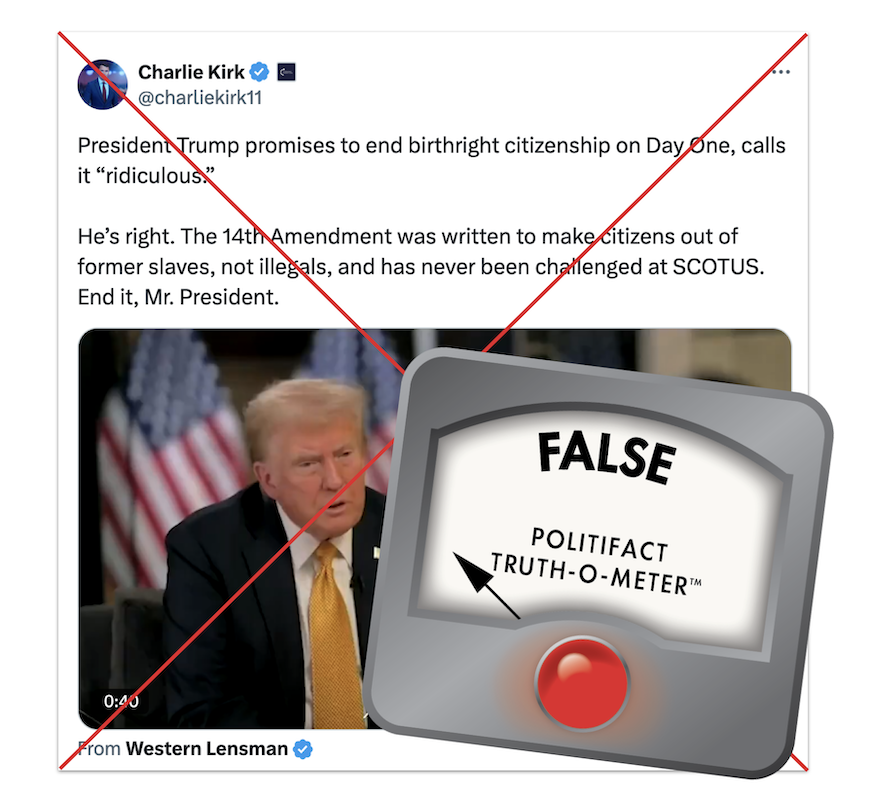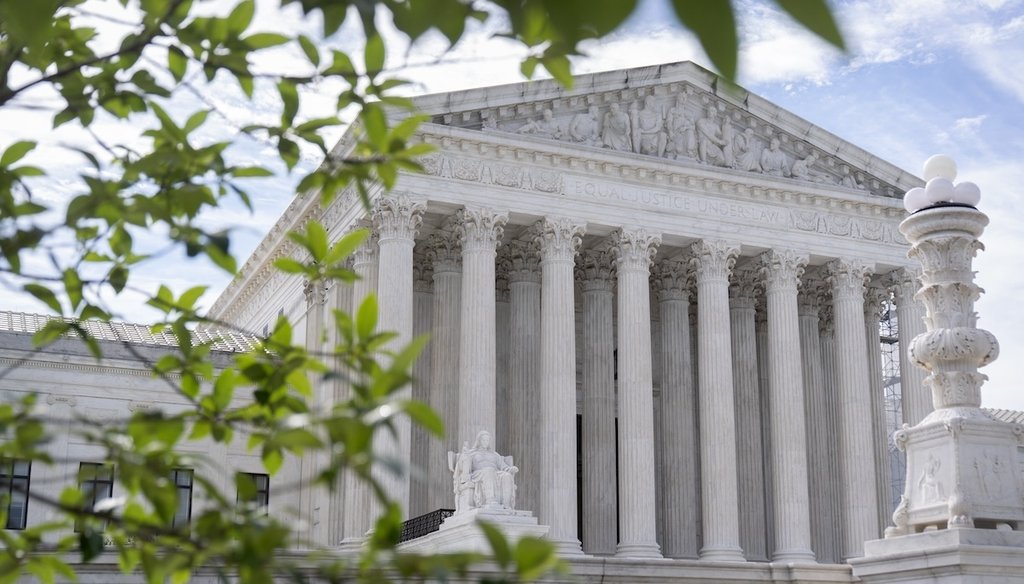

Our only agenda is to publish the truth so you can be an informed participant in democracy.
We need your help.


The Supreme Court building is seen June 27, 2024, in Washington. (AP)
In United States v. Wong Kim Ark, the U.S. Supreme Court ruled that the 14th Amendment provides people born in the U.S. citizenship at birth, even if their parents are not U.S. citizens.
Immigration and law experts who’ve studied birthright citizenship told PolitiFact it’s inaccurate to say that the 14th Amendment’s citizenship clause has never been challenged at the Supreme Court.
Conservative commentators celebrated President-elect Donald Trump’s reaffirmed commitment to ending birthright citizenship, a goal that he failed to achieve during his first presidential term.
Charlie Kirk, founder and president of the conservative group Turning Point USA, shared on X a video clip of Trump on NBC’s "Meet the Press" discussing his desire to end birthright citizenship — and the limitations of the U.S. Constitution’s 14th Amendment, which says that all "born or naturalized in the United States" are citizens.
"President Trump promises to end birthright citizenship on Day One, calls it ‘ridiculous,’" Kirk wrote in a Dec. 8 X post. "He’s right. The 14th Amendment was written to make citizens out of former slaves, not illegals, and has never been challenged at SCOTUS. End it, Mr. President."

(Screenshot from X)
The idea that the nation’s highest court had never scrutinized a challenge to one of the Constitution’s 27 amendments raised questions among X users, who used the platform’s Community Notes feature to rebut Kirk’s claim. The 14th Amendment "was challenged in Wong Kim Ark vs United States," read the note appended to Kirk’s post.
The 14th Amendment enshrined the concepts of "due process" and "equal protection" under law for U.S. citizens. Parts of the amendment have been challenged in numerous U.S. Supreme Court cases, with the court establishing its protections in milestone civil rights movement cases such as Brown v. Board of Education, which ruled public school segregation was unconstitutional, and Loving v. Virginia, which established interracial marriage as a protected right.
Immigration and law experts who’ve studied birthright citizenship also confirmed that the 14th Amendment’s citizenship protections have been litigated before the Supreme Court. In United States v. Wong Kim Ark, the court ruled that the 14th Amendment provides people born in the U.S. citizenship at birth — even if their parents are not U.S. citizens, four experts said.
We contacted Kirk and received no response.
Kirk has contested legal interpretations of the 14th Amendment and its citizenship clause for years. In 2023, he said the amendment is "too broad" and is used as a "catch all" to justify things such as birthright citizenship. During a Sept. 1 podcast, he called the idea that it grants birthright citizenship a "terrible interpretation."
The immigration-related Supreme Court case centered on Wong Kim Ark, the son of Chinese immigrants who was born in the U.S. in 1873. Wong’s parents were both Chinese citizens residing in the U.S. who could not become naturalized citizens because of the Chinese Exclusion Act.
All his life, Wong lived in California, according to the agreed facts of the case. In 1890, he made a temporary trip to China and was allowed to reenter the U.S. when he returned "upon the sole ground that he was a native-born citizen of the United States."
After Wong traveled to China for another temporary trip in 1894, however, authorities denied him reentry to the United States, saying he was not a U.S. citizen.
The Supreme Court was asked to determine whether Wong had become a U.S. citizen at birth "by virtue of the first clause of the 14th Amendment of the Constitution," which says: "All persons born or naturalized in the United States, and subject to the jurisdiction thereof, are citizens of the United States and of the state wherein they reside."
In a 6-2 decision in 1898, the court ruled yes. (One justice did not participate in the decision because the oral arguments predated his judicial term.)
"Every person born in the United States, and subject to the jurisdiction thereof, becomes at once a citizen of the United States, and needs no naturalization," the opinion read.
Cassandra Burke Robertson, a Case Western Reserve University law professor, called the court’s ruling a "powerful" declaration that the 14th Amendment’s citizenship clause superseded the Chinese Exclusion Act, a "conflicting federal statute."
Ediberto Roman, law professor and immigration and citizenship initiatives director at Florida International University, described the 14th Amendment’s birthright citizenship as a "bedrock of constitutional law."
"The court recognized that because (Wong) was born in the United States, he was a citizen of the United States," Roman said. "The case addresses the issue conclusively."
Roman said federal courts — including the Supreme Court — have repeatedly upheld that the 14th Amendment guarantees citizenship at birth.
"For instance, in 1985, Immigration and Naturalization Service v. Rios-Pineda, the high court recognized birthright citizenship in deportation proceedings instituted against the respondents," he said. "By the time the proceedings commenced, the respondents had a child born in the United States. The Rios-Pineda Court observed, with little question or equivocation, that because the child was born in the United States, the child was in fact a citizen."
Ernesto Sagás, an ethnic studies professor at Colorado State University, said Kirk is either "unaware of U.S. legal history" or "stirring the pot and pretending that Trump would innovate by legally challenging the 14th Amendment."
With Wong’s case in mind, Michael LeRoy, a labor and employment relations professor at University of Illinois at Urbana-Champaign, said: "Anyone who says that the 14th Amendment birthright citizenship clause has not been challenged before the Supreme Court is wrong."
The Supreme Court mentioned two exceptions to birthright citizenship in United States v. Wong Kim Ark, Robertson said.
The court wrote that the addition of the phrase "and subject to the jurisdiction thereof" in the 14th Amendment "would appear to have been to exclude … two classes of cases" from birthright citizenship. First, "children born of alien enemies in hostile occupation" and "children of diplomatic representatives of a foreign State."
Robertson said that to her knowledge the "alien enemies" exception has never been litigated, meaning its limits are unclear — and that perhaps Kirk and other birthright citizenship critics are zeroing in on this detail. However, Robertson said she thought it was "ridiculous" to categorize immigrants in the country illegally as "alien enemies" engaged in "hostile occupation."
People questioning the legal basis for birthright citizenship have also argued that the Supreme Court never specifically ruled on whether the children of immigrants in the country illegally would qualify for citizenship. Peter J. Spiro, a Temple University Law School professor, told PolitiFact that there weren’t federal immigration controls when the 14th Amendment was adopted, so there’s no direct evidence how the drafters would have intended it to apply to that group.
In 2015, we rated Mostly True a more specific claim from Sen. Rand Paul, R-Ky., that the Supreme Court had never directly ruled on whether the children of people in the U.S. illegally are citizens, because in the Wong Kim Ark case, Wong’s parents were noncitizens when he was born and there’s no indication they were in the U.S. illegally. Kirk’s statement did not make that distinction and he did not respond to our questions seeking clarity.
Sagás, who researches U.S. immigration policies, said eliminating or changing the 14th Amendment would be "extremely difficult," so Kirk and his allies might hope that the Supreme Court, with its conservative majority, "will reinterpret the amendment to exclude the children of the undocumented."
On X, Kirk said the 14th Amendment "has never been challenged at SCOTUS."
Immigration and law experts who’ve studied birthright citizenship say that the 14th Amendment’s citizenship clause has been challenged at the Supreme Court. (It’s been challenged on nonimmigration-related cases, too.)
In United States v. Wong Kim Ark, the Supreme Court ruled that the 14th Amendment provides people born in the U.S. citizenship at birth, even if their parents are not U.S. citizens.
Experts said some elements of the 14th Amendment’s citizenship clause have not been fully litigated by the Supreme Court, such as the exact exceptions to birthright citizenship conveyed by the phrase "and subject to the jurisdiction thereof."
But that is not what Kirk said.
We rate his claim False.
RELATED: Fact-checking Donald Trump’s interview with ‘Meet the Press’
RELATED: Donald Trump is reiterating his promise to overturn birthright citizenship. Can he do it?
RELATED: Birthright citizenship didn’t apply to Trump’s children, experts say
Charlie Kirk X post, Dec. 8, 2024
Phone interview with Ediberto Roman, Professor of Law and Director of Immigration and Citizenship Initiatives at Florida International University, Dec. 9, 2024
Email interview with Cassandra Burke Robertson, law professor at Case Western Reserve University, Dec. 9, 2024
Email interview with Ernesto Sagás, ethnic studies professor at Colorado State University, Dec. 9, 2024
Email interview with Michael H. LeRoy, LER Alumni Professor of Labor and Employment Relations at University of Illinois at Urbana-Champaign, Dec. 9, 2024
PolitiFact, Donald Trump falls short on promise to end birthright citizenship, July 15, 2020
PolitiFact, Donald Trump’s 2024 campaign promises: Here’s his vision for a second term, Sept. 30, 2024
PolitiFact, Birthright citizenship: Could Ron DeSantis end it? And if so, how? June 29, 2024
PolitiFact, Donald Trump is reiterating his promise to overturn birthright citizenship. Can he do it? Dec. 10, 2024
PolitiFact, Rand Paul says legality of birthright citizenship not fully adjudicated due to facts of 1898 case, Sept. 18, 2015
National Archives, 14th Amendment to the U.S. Constitution: Civil Rights (1868), accessed Dec. 9, 2024
Immigration History, United States v. Wong Kim Ark (1898), accessed Dec. 9, 2024
Library of Congress, UNITED STATES v. WONG KIM ARK, accessed Dec. 9, 2024
Oyez, United States v. Wong Kim Ark, accessed Dec. 9, 2024
American Constitution Society for Law and Policy, Born Under the Constitution: Why Recent Attacks on Birthright Citizenship are Unfounded, March 2011
National Immigration Forum, Q&A: Birthright Citizenship, accessed Dec. 9, 2024
American Immigration Council, Birthright Citizenship in the United States, October 2024
Migration Policy Institute, Repealing Birthright Citizenship: The Unintended Consequences, August 2015
University of Illinois Urbana-Champaign, Can birthright citizenship be repealed? Dec. 5, 2024
Texas Law Review, Integral Citizenship, July 21, 2022
American University Law Review, Birthright Citizenship Under Attack: How Dominican Nationality Laws May be the Future of U.S. Exclusion, 2017
Justia, United States v. Wong Kim Ark, 169 U.S. 649 (1898), accessed Dec. 10, 2024
Oyez, Immigration and Naturalization Service v. Rios-Pineda, accessed Dec. 10, 2024
Library of Congress, Immigration and Naturalization Service v. Rios-Pineda, accessed Dec. 10, 2024
National Constitution Center, 10 Supreme Court cases about the 14th Amendment, July 9, 2020
Justia, Plyler v. Doe, 457 U.S. 202 (1982), accessed Dec. 10, 2024
Library of Congress, Plyler v. Doe, 457 U.S. 202 (1982), accessed Dec. 10, 2024
Oyez, Plyler v. Doe, accessed Dec. 10, 2024
Oyez, Brown v. Board of Education of Topeka (1), accessed Dec. 10, 2024
Oyez, Loving v. Virginia, accessed Dec. 10, 2024
History, The Birth of ‘Illegal’ Immigration, July 2, 2019
The Charlie Show, Charlie Kirk Takes Questions from Subscribers on Birthright Citizenship, RFK Jr, and More, Sept. 1, 2024
Media Matters, Charlie Kirk: The 14th Amendment was "too broadly" and "sloppily written," Aug. 21, 2023
In a world of wild talk and fake news, help us stand up for the facts.
